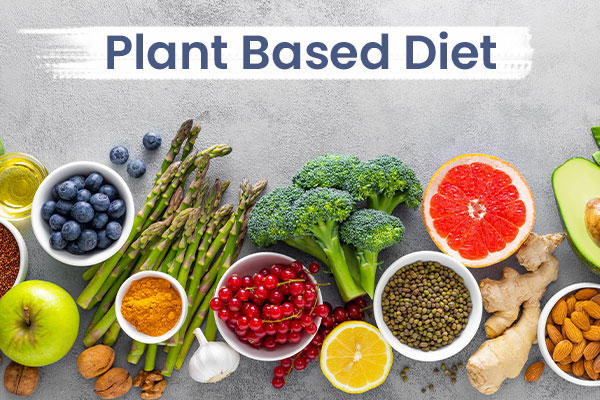Plant-based diets have become increasingly popular, primarily due to their demonstrated health benefits. By focusing on whole foods derived from plants, including fruits, vegetables, legumes, nuts, seeds, and whole grains, a plant-based diet provides a rich array of nutrients beneficial to health. From heart health to weight management, diabetes prevention, digestive health, and more, a plant-based diet offers a holistic approach to wellness. Moreover, adopting a plant-based diet is not just good for individual health, but it also contributes significantly to environmental sustainability. Here, Health benefits of a plant-based diet can provide and how to embrace this lifestyle.
What is Plant-Based Diet?

A plant-based diet is a dietary approach that focuses on consuming foods primarily derived from plants, such as fruits, vegetables, whole grains, legumes, nuts, and seeds. It emphasizes minimizing or eliminating the consumption of animal products, including meat, dairy, eggs, and honey. The foundation of a plant-based diet lies in incorporating a wide variety of nutrient-rich plant foods, which are abundant in vitamins, minerals, fiber, and phytochemicals. Plant-based diets are known for their potential health benefits, including reducing the risk of chronic diseases, promoting weight management, and improving overall well-being. However, the specific composition of a plant-based diet can vary, with some individuals including limited amounts of animal products or following a strictly vegan approach.
Why should you try Plant-Based Diet?

There are several compelling reasons to consider trying a plant-based diet. First and foremost, it offers numerous health benefits. Plant-based diets are typically rich in fiber, vitamins, minerals, and antioxidants, which can support overall well-being and reduce the risk of chronic diseases like heart disease, type 2 diabetes, and certain cancers.
Additionally, plant-based diets are often lower in saturated fat and cholesterol, making them beneficial for cardiovascular health. Another crucial reason to adopt a plant-based diet is its positive impact on the environment. Plant-based diets have a lower carbon footprint, require fewer resources, and contribute to reducing deforestation and greenhouse gas emissions. Many people choose a plant-based diet for ethical reasons, as it promotes animal welfare and avoids the use of animal products.
Related: Natural Remedies for Managing Diabetes at Home
1. Heart Health
A plant-based diet, rich in fruits, vegetables, legumes, and whole grains, can significantly improve heart health. These foods are high in fiber, which helps lower harmful LDL cholesterol levels and reduce the risk of heart disease. Additionally, a plant-based diet is naturally low in saturated fats and sodium, aiding in maintaining a healthy blood pressure. Key nutrients like potassium, found abundantly in plant foods, also help regulate blood pressure. Moreover, the variety of antioxidants and anti-inflammatory compounds in plant foods protect against oxidative stress and inflammation, two key factors in heart disease. Thus, a plant-based diet is a powerful tool for heart health.
2. Weight Management
Plant-based diets are rich in fiber, which aids in digestion and keeps you feeling fuller for longer periods, reducing the need for excessive eating and aiding in weight management. In addition, these diets are typically lower in calories compared to diets high in meat and dairy products. Whole plant foods like fruits, vegetables, legumes, and whole grains, have lower energy density, meaning they provide fewer calories relative to their weight, thus allowing you to eat satisfying portions while managing your weight. By focusing on nutrient-dense plant foods, you can enjoy a variety of delicious meals while maintaining a healthy weight.
3. Diabetes Prevention and Management
A plant-based diet can be a powerful tool in preventing and managing diabetes. This diet is rich in fiber, which slows the absorption of sugar into your bloodstream and prevents spikes in blood glucose levels. Moreover, whole plant foods have a low glycemic index, implying that they cause a slower rise in blood sugar levels compared to processed foods. Studies have shown that individuals following a plant-based diet have lower insulin resistance, making it easier for them to control their blood sugar. Additionally, the weight loss associated with plant-based diets can significantly reduce the risk of developing type 2 diabetes.
4. Digestive Health
A plant-based diet significantly contributes to improved digestive health due to its high fiber content. Fiber adds bulk to your diet and aids in regular bowel movements, preventing constipation and promoting overall gut health. Additionally, fiber serves as a prebiotic, providing nourishment for beneficial gut bacteria, thereby enhancing gut microbiota diversity. This can lead to improved immunity, better mood regulation, and even weight management. Some research also suggests that a plant-based diet may reduce the risk of gastrointestinal disorders, including irritable bowel syndrome and diverticular disease. So, adopting a plant-based diet can be an effective strategy for maintaining a healthy digestive system.
5. Energy Levels
Adopting a plant-based diet can have a positive impact on your energy levels. Whole plant foods like fruits, vegetables, grains, and legumes are rich in complex carbohydrates, which your body breaks down slowly, providing a steady source of energy throughout the day. This helps prevent energy spikes and crashes that can occur after eating processed or sugar-laden foods. Furthermore, the abundant nutrients, including vitamins, minerals, and antioxidants found in plant foods, support overall body functions and promote vitality. Also, a diet rich in fiber from plant sources can aid digestion and increase satiety, contributing to an overall feeling of well-being and sustained energy.
6. Skin Health
A plant-based diet offers numerous health benefits, including promoting radiant and healthy skin. Fruits, vegetables, whole grains, nuts, and seeds are rich in vitamins, minerals, antioxidants, and phytochemicals that nourish the skin from within. These nutrients help protect against cellular damage, improve collagen production, and maintain skin elasticity. The high fiber content in a plant-based diet also promotes healthy digestion and aids in detoxification, which can contribute to clearer skin. Moreover, the reduced intake of processed foods and added sugars often associated with a plant-based diet may help prevent or manage skin conditions like acne and inflammation. By embracing a plant-based lifestyle, you can enhance your skin’s natural glow and promote long-term skin health.
7. Longevity
A plant-based diet has been associated with numerous health benefits, including the potential for a longer life. Research suggests that individuals who follow a plant-based diet tend to have a lower risk of developing chronic diseases such as heart disease, type 2 diabetes, and certain types of cancer. These conditions are known to impact longevity. The abundance of fiber, antioxidants, and phytonutrients found in plant-based foods contribute to overall health and well-being, reducing inflammation and oxidative stress in the body. Additionally, plant-based diets are often lower in saturated fat and cholesterol, which can help maintain a healthy cardiovascular system.
8. Environmental Impact
Personal health benefits of a plant-based diet has a positive impact on the environment, which can contribute to long-term global sustainability and, indirectly, human longevity. Animal agriculture is a major contributor to greenhouse gas emissions, deforestation, and water pollution. By reducing or eliminating animal products from our diet, we can reduce our carbon footprint, preserve natural resources, and help mitigate climate change. Plant-based diets require fewer land and water resources and produce significantly lower emissions. By choosing plant-based options, we contribute to a healthier planet, ensuring a sustainable future for generations to come. The longevity of our environment is intricately linked to our own longevity and well-being.

Conclusion
Adopting a plant-based diet can have profound positive effects on overall health and well-being. The abundance of nutrient-dense fruits, vegetables, whole grains, legumes, nuts, and seeds in a plant-based diet provides the body with essential vitamins, minerals, fiber, and antioxidants. These nutrients support optimal bodily functions, boost the immune system, and help prevent chronic diseases like heart disease, type 2 diabetes, and certain types of cancer. Plant-based diets are also typically lower in saturated fat and cholesterol, which are known to contribute to cardiovascular problems. Moreover, the environmental benefits of a plant-based diet, such as reduced carbon footprint and conservation of resources, contribute to long-term sustainability and the well-being of the planet.
By embracing a plant-based diet, individuals can take control of their health, promote longevity, and contribute to a more sustainable world. However, it’s important to note that a well-planned plant-based diet should ensure adequate nutrient intake, including essential nutrients like vitamin B12, iron, calcium, and omega-3 fatty acids. Consulting with a healthcare professional or registered dietitian can help ensure proper nutrition and guide the transition to a plant-based lifestyle. With mindful choices and a variety of plant-based options, individuals can reap the many health benefits of a plant-based diet and enjoy a vibrant, wholesome, and sustainable way of life.


